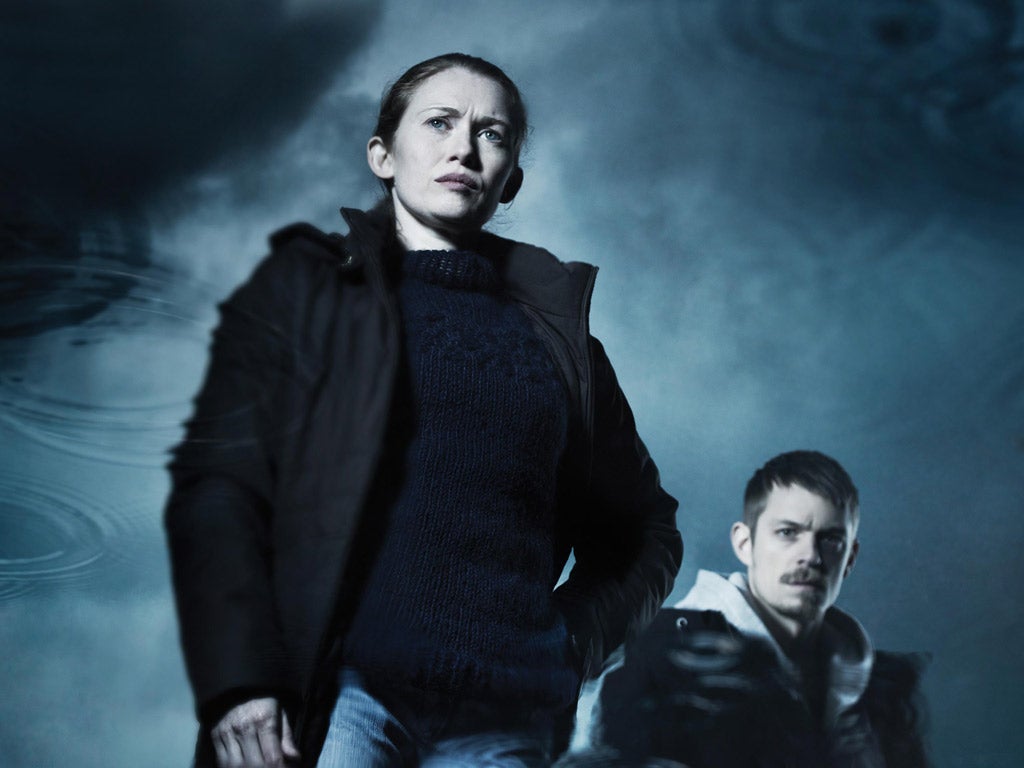The Killing, C4, Wednesday The Hunt for Bin Laden, ITV1, Tuesday
TV dramas, like jumpers, can be too stretched

Your support helps us to tell the story
From reproductive rights to climate change to Big Tech, The Independent is on the ground when the story is developing. Whether it's investigating the financials of Elon Musk's pro-Trump PAC or producing our latest documentary, 'The A Word', which shines a light on the American women fighting for reproductive rights, we know how important it is to parse out the facts from the messaging.
At such a critical moment in US history, we need reporters on the ground. Your donation allows us to keep sending journalists to speak to both sides of the story.
The Independent is trusted by Americans across the entire political spectrum. And unlike many other quality news outlets, we choose not to lock Americans out of our reporting and analysis with paywalls. We believe quality journalism should be available to everyone, paid for by those who can afford it.
Your support makes all the difference.Though it has long been established in the vernacular of popular television, it is less common than you might think for a programme to suddenly "jump the shark". What is more likely to happen is that there will be a long, drawn-out decline in standards and a stretching of ridiculous plotlines and subplotlines until the viewer is left with little more than the programme as brand, a shadowy symbol of its former self kept in the schedules more to satisfy advertisers than anyone left watching.
True Blood, 24, Desperate Houswives, Glee ... You know who you are. All are more guilty of what might be called stretching the red herring rather than jumping the shark. But the American version of The Killing is unique in that it managed to alienate the majority of its audience over the course of its first season. Which was some achievement given that the series could boast the exquisite source material of its Danish original, a cast that favoured understated, remarkable performers over glitzy star names, and an array of directors including the award-winning film-maker Agnieszka Holland.
It was Holland who returned to the helm for the Series Two opener, a daunting task when you consider that the previous season's "finale" (we've all started using US TV presenter speak these days) caused an uproar for throwing everything up in the air at the very last moment.
Sarah Linden (the excellent Mireille Enos) has decided to stay in Seattle to investigate the Rosie Larsen case further. Her former partner, Stephen Holder, who we know received doctored evidence, has been promoted and appears to be up to no good. The person we were led to believe was guilty up until that final moment of Series One (the mayoral candidate Darren Richmond) has been shot by another previous suspect, Belko, who works for the victim's father.
Got that? Look, it's quite simple .... Actually, let's not bother. Because while this reviewer was happy to defend the American remake against the cultural snobs who argued that the Danish version was vastly superior, it seems increasingly likely that it will not be worth keeping track of the second series. Superior production values and acting are one thing, but The Killing has now veered so far from the crime which gives it its name as to feel like a shaggy-dog story.
Rosie Larsen's murderer is still on the loose. One by one the suspects have been killed or, in the case of Richmond, paralysed. It is difficult to guess where the series will go from here. It is even harder to see where its audience will come from.
If you were looking for a more satisfying exercise in tracking down a criminal, ITV's The Hunt for Bin Laden provided it. Here was a sober, satisfying documentary that, while it had no real shocks, contained enough small but substantial details to repay the nearly two-hour running time.
The key players in the CIA and the FBI were lined up in front of the cameras to claim their place in the history books. While no one would admit they had personally screwed up, all accepted that mistakes were made and one agent was bold enough to suggest that there was a touch of the Keystone Cops about the whole operation. Only Leon Panetta, the director of both the CIA and the mission that finally killed Bin Laden, emerged with any credit, and it is no surprise that he has since been confirmed as US Secretary of Defense by the Senate in a vote of 100-0.
What made the programme so compelling was that, given such a wealth of background information about Bin Laden – from his role in the mujahedin resistance in Afghanistan in the late 1980s ("his leaders valued him more for his millions than his skill with a Kalashnikov") to his final hiding place in Abbottobad – the operation that ended in his being shot played out like a thriller.

Watch Apple TV+ free for 7 days
New subscribers only. £8.99/mo. after free trial. Plan auto-renews until cancelled

Watch Apple TV+ free for 7 days
New subscribers only. £8.99/mo. after free trial. Plan auto-renews until cancelled
A name extracted from the "interrogation" of a prisoner in Guantanamo Bay led investigators to one Abu Ahmed al-Kuwaiti. Al-Kuwaiti's car was tracked to Bin Laden's walled compound and, 15 years after issuing a fatwa against America, that country had its man and The Hunt for Bin Laden had its gripping dénouement. Which is more than you can say for certain other TV programmes.
Join our commenting forum
Join thought-provoking conversations, follow other Independent readers and see their replies
Comments